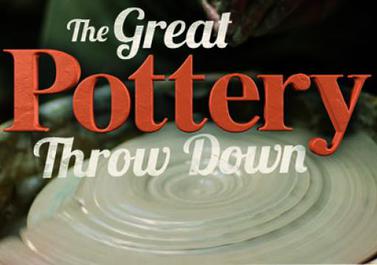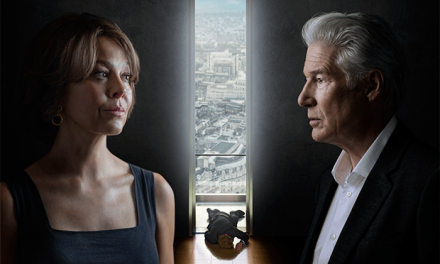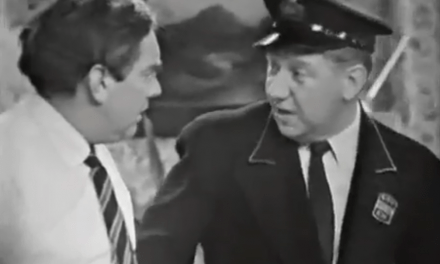SP: I’d like to start, if I may, with the most immediately arresting and confusing element of Luck, one which has been highlighted by plenty of reviewers and critics in the UK: that of its narrative and language. Many have commented on the difficulty of following the story and understanding the performers’ delivery of dialogue. There seems to be a purposeful (wilful?) obscurity at work in plotting, word choice, and delivery. This seems a big risk and a big ask for the viewer.

Richard Kind as Joey Rathburn
JJ: Some of the dialogue is hard to understand but that does not mean it is hard to follow. It’s hardly a hymn to narrative complexity: there are people who own horses, who ride them, who bet on them, who win and lose at the races. That much is clear even if we can’t track the nuance of jargon and accents. True, we do get a sense of a larger design which might or might not get clarified- Bernstein’s (Hoffman) plans may or not be something to do with revenge; and the show as a whole conveys a sense of obscurity, as if it wants to discourage us from the usual forms of involvement. In a later episode we get an ‘audience surrogate’ moment when a young financial hotshot Nathan Israel is quizzed by Bernstein in an obscure way, but we can tell he likes him. It’s as if the show is telling us it is OK, but you have to have faith. It raises another question connected to its legibility which is to what extent we have to live into an artwork before we can appreciate it, or before we realise the game wasn’t worth the candle. Maybe that time is never. It is an enormous risk as you say, especially in television, it is almost doing things in reverse.
SP: Yes, doing things in reverse, or at least out of the usual order. We are now [at the time of writing] on episode 3 in the UK [showing on Sky Atlantic] and I am only just getting the sense that the series is ready to introduce its characters to us (there is a lot of naming going on in this episode, which also features the moment you refer to between Israel and Bernstein). Of course, there are precedents of contemporary American serial dramas that present a tight-knit world and use ‘difficult’, community-specific language: The Wire, and Generation Kill, for example. In all instances, the language adds to the sense of verisimilitude and acts both as invitation and buffer to the viewer’s entrance into this private, intimate world. As we gradually familiarise ourselves with linguistic rhythms, terms, colloquialisms and idiosyncrasies, we draw ever closer to the series. Luck takes this up a notch. As Walter Smith, Nolte ‘s characteristic throaty delivery becomes a raspy growl, words mashed together. Difficulties getting words out, or making them stick, becomes a motif: Marcus (Kevin Dunn) wheezes for breath; Joey (Richard Kind) stammers; Smith hesitates over telephones and calls; Bernstein records his spoken thoughts electronically as he is losing his memory. I’m reminded of a remark from your earlier piece on the series for CST Online (to which you allude above), that ‘Understanding the show is less important than cleaving to its moods and ways of binding as well as repelling us (that is, repelling in order to bind us even tighter to it).’ We have to feel our way into the world of Luck, a state encouraged in the first episode by Mann’s compelling shaping of racing spaces. But again, even more so than in the other TV dramas I mention, this is complicated by the series’ stylistic designs. All the usual instruments of television drama are retuned, its visual and aural equalizer tweaked and altered. Visually, from the first episode (taking Mann’s lead), faces and objects are often pushed into the foreground of cluttered settings, with bursts of primary colours and a fascination with numbers lived out in close-up. The musical soundtrack blasts into scenes with songs from an eclectic range of styles – rock, jazz, electronica, orchestral – interrupting and interrupted. Performance styles also range from quasi-Method turns (Hoffman and Nolte) to cartoony types (Kind) to awkward aggrandisements of ‘American’ mannerisms and accents (Ian Hart and Tom Payne). The handling of Hoffman’s apartment and board-room scenes is a world away, stylistically, from that of the race-track. Another observation from your earlier piece is particularly useful here: ‘We get a sense, familiar in Milch’s art, of a unity created from disparate, seemingly unrelated parts.’ To return to my musical analogy, I wonder if the re-arrangement of stylistic phrasings and notes from television drama creates, here, a surprising atonal work (lacking a tonal centre, yet coherent in and of itself), or discordance?

Patrick J. Adams as Nathan Israel
JJ: The discordance is striking, we are frequently misdirected and thrown in new and surprising ways. We encouraged to think the show has a plan, like Bernstein has a plan, but then we are caused in various ways to doubt its coherence or its importance. The soundtrack is part of that: I don’t know another show that uses music so insistently in nearly all its scenes reminding us of – of what? – of the kind of momentum or mood we should follow, or attend to? Or is it a distraction, something to lull us into mistaken certainties? Is there such a thing as patient teaching without a coherent plan, a desire to take us up into a world that is not part of a settled view? I’m not suggesting, as some reviewers have, that the point is to refuse clarity or definition in a kind of modernist gesture. I think it is trying to discover and articulate something about human beings in fiction that believes it knows more about than the rest of us and yet is still obscure to its makers. As those same reviewers have noted, the idea of a fundamental concord or unity underlying the universe is an important Milch theme that seems to be put under quite a lot of stress here. Part of that maybe connected to the ways in which the mismatch between what I’ve called in my CST blog on Homeland the mediation between ‘inner’ and ‘outer’, especially involving those desires we have but do not want to have, as if we are haunted by aspects of ourselves. This theme is most prominently figured with those characters who are compelled by addiction, but it goes to a deeper place about the relationship between appearance and essence, past and present. Take the most apparently legible character, Bernstein’s villainous British nemesis Mike, played by Michael Gambon. Like us he just wants to figure out how Bernstein is trying to fuck with him, and he shares with Bernstein a ferocious attention to the detail of self-expression and appearance, as if reading mood, reading that relation between inner and outer is the source of all true power. Being able to read that discrepancy or concordance between inner and outer is of the essence when it comes to gambling, especially horseracing, where the divination of form is itself an art. But that brings us back to performance and evaluation doesn’t it?

Michael Gambon as Michael
On March 14 HBO announced that they were cancelling the show, which was in production on its second season. Next time Steven and Jason will continue their conversation and respond to this event.
Jason Jacobs is Reader in Cultural History in the School of English, Media Studies and Art History, University of Queensland. He is author of The Intimate Screen and Body Trauma TV. He is currently working on an Australian Research Council funded project called ‘Worldwide: the history of the commercial arm of the BBC’. His BFI TV Classic on on Deadwood will be out in May. He is writing a book on David Milch for the Manchester University Press Television Series and is co-editor with Steven Peacock of the forthcoming collection Global Television: Aesthetics and Style (Continuum).
Steven Peacock is Senior Lecturer in Film at the University of Hertfordshire. He is the editor/author ofReading 24: TV against the Clock (2007), and the co-editor of The Television Series for Manchester University Press. He is also the author of Colour: Cinema Aesthetics (Manchester University Press, 2010) and Hollywood and Intimacy: Style, Moments, Magnificence (Palgrave Macmillan, 2011). He is currently writing Swedish Crime Fiction: Adaptations from Novel to Global Film and Television(Manchester University Press), and is co-editor with Jason Jacobs of the forthcoming collection Global Television: Aesthetics and Style (Continuum).





